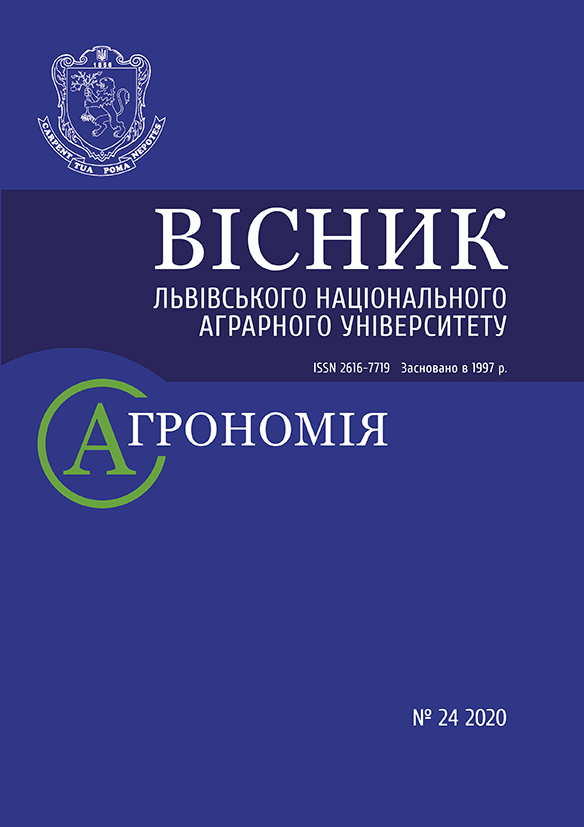Visnyk LNAU: Agronomy 2021 №25: 141-145
YIELD AND QUALITY OF MAIZE GRAIN UNDER APPLYING DIFFERENT FERTILIZERS IN THE FIELD CROP ROTATION
Hospodarenko H., Doctor of Agricultural Sciences
ORCID ID: 0000-0002-6495-2647
Prokopchuk I., Candidate of Agricultural Sciences
ORCID ID: 0000-0001-9608-6061
Boiko V.
ORCID ID: 0000-0002-8139-2039
Uman National University of Horticulture
https://doi.org/10.31734/agronomy2021.01.141
Annotation
The effect of prolonged use of different doses and ratios of mineral fertilizers in a 4-field crop rotation on the yield and quality of maize was investigated in the research. The study was performed in a stationary field experiment on podzolized heavy-loam black land soils in the Right-Bank Forest-Steppe of Ukraine. The article presents the average yield and quality of maize according to the results of determinations during 2016–2018, at the time of this crop rotation. The experiment scheme included eleven variants of combinations and separate application of mineral fertilizers, including the test variant without fertilizers. In the experiment, where the average dose of nutrients in crop rotation was N110P60K80 per hectare, it was planned to make total (100 %) compensation of fertilizers for economic absorbing by crops of the essential nutrients. It has been found that the systematic application of fertilizers in crop rotation increases the maize yield by 18–77 %. The highest yields (13.07 t/ha) were provided by applying N110P60K80 on 1 ha of crop rotation area, including on maize – N160P60K110. Exclusion of the nitrogen component from the complete fertilizer (N160P60K110) reduced maize yield by 47%, whereas phosphorous – by 25 %, and potassium by 19%. The reduction of phosphorus fertilizers dose from 60 to 30 kg p.n./ha and potassium ones from 80 to 40 kg p.n./ha in the composition of complete mineral fertilizer reduced the maize yield by 11 and 6 %, respectively. While reducing the doses of phosphorus and potassium fertilizers, grain yield decreased by 13 %.
According to the generalized index of grain quality, it is preferable to apply maize with complete mineral fertilizer at a dose of N160P30–60K55–110. The largest grain unit of maize was formed by the doses of N60К60, N160P60K110 and N160P60K110 fertilizers, and its content of protein (10.3 %) and fat (4.2 %) – under applying complete mineral fertilizer at the dose of N160P60K110.
Key words
maize, fertilizer, podzolized black land soil, yield, grain-unit, protein, fat
Link
- Adaptation of Agricultural Technologies to Climate Change: Soil-Agrochemical Aspects/Eds: S. A. Baliuk, V. V. Medviedev, B.S. Nosk. Kharkiv, 2018. 364 p.
- Azzi J. Agricultural Ecology. Moscow: Publishing House of Foreign Literature, 1959. P. 242–243.
- Bosak V. N. Optimization of Plant Nutrition: monograph. Saarbrücken: Lambert Academic Publishing, 2012. 203 p.
- Concept of Achieving a Neutral Level of Degradation of Lands (Soils) in Ukraine. Eds: S. A. Baliuk, V. V. Medviedev, M. M. Miroshnychenko. Kharkiv: SP Brovin O. V., 2018. 32 p.
- Handbook of Product Quality Target of Agricultural Crops in Different Soil and Climatic Zones of Ukraine (reference and normative information). Eds: S. A. Baliuk, M. V. Lisovyi. Kharkiv, 2016. 46 p.
- Hladkikh E.Yu., Krupoderia Yu.O., Panasenko Ye.V. Role of Individual Elements in Increasing the Stress Resistance of Plants in Extreme Weather Conditions (2016). Man and Environment. Problems of Neoecology, 2016. №1–2 (25). P. 55–63.
- Hospodarenko H., Prokopchuk I., Prokopchuk S., Trus A. Humus Content in a Podzolized Black Land Soil after a Long-Term Application of Fertilizers in a Field Crop Rotation. Agronomy Research. 2018. Vol. 16, № 3. P. 737–748.
- Khrystenko A. A. Soil Fertility in Ukraine and Fertilizer Effectiveness. Agrochemistry and Soil Science (special issue). 2018. Book. 2. P. 234–235.
- Kramariov S. M. Fertilization of Maize on Ordinary Black Land Soils in the Steppe zone of Ukraine. Dnepropetrovsk, 2010. 632 p.
- Medviedev H. A., Eranov D. V., Shadryn S. D. Nutritional Value of Maize Hybrids. Maize and Sorghum. 2001. № 6. P. 2–3.
- Methods of Agrochemical Certification of Agricultural Lands: Guiding normative document. Eds: I. P. Yatsuk, S. A. Baliuk. 2nd enl. ed. Kyiv, 2019. 108 p.
- Nadtochaev N. F. Maize in the Fields of Belarus. Minsk: Minfin Publishing Centre, 2008. 412 p.
- Parkhomenko M. M. Productivity of Short-Term Crop Rotations under Different Fertilizer Systems in Polissia. Agrochemistry and Soil Science (special issue). 2018. Book. 2. P. 203–204.
- Stationary Field Experiments in Ukraine. Kyiv: Agrarian Science, 2014. 146 p.
- Synytskyi O. M., Batiuk O. Ya. Econometrics. Lviv, Spolom. 210 p.
- System of Agricultural Crops Fertilization at the beginning of the 21st Century/Eds: S. A. Baliuk, M. M. Miroshnychenko. Kyiv, 2016. 400 p.



